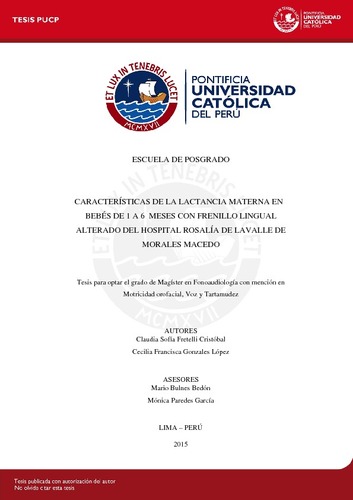| dc.contributor.advisor | Bulnes Bedón, Mario Santiago | |
| dc.contributor.advisor | Paredes García, Mónica | |
| dc.contributor.author | Fretelli Cristóbal, Claudia Sofía | es_ES |
| dc.contributor.author | Gonzales López, Cecilia Francisca | es_ES |
| dc.date.accessioned | 2016-06-28T17:51:55Z | es_ES |
| dc.date.available | 2016-06-28T17:51:55Z | es_ES |
| dc.date.created | 2015 | es_ES |
| dc.date.issued | 2016-06-28 | es_ES |
| dc.identifier.uri | http://hdl.handle.net/20.500.12404/7046 | |
| dc.description.abstract | La lactancia materna es uno de los elementos trascendentales para la vida
humana, no solo en términos nutricionales sino también por los componentes
afectivos que se dan en ella, además de permitir el desarrollo adecuado de las
estructuras esqueletales de la cara y de las funciones estomatognáticas (succión,
deglución, masticación y habla).
Las características del frenillo lingual en bebés posibilita o interfiere en el
movimiento de la lengua, afectando la lactancia, por ello el diagnóstico precoz del
frenillo lingual alterado y una intervención temprana beneficiará las funciones de
succión, deglución durante la lactancia y evitará problemas posteriores,
principalmente del habla, dificultad más común que requiere de un tratamiento
fonoaudiológico.
El método empleado en el presente trabajo es de tipo descriptivo simple en la
medida que se busca establecer las características de lactancia en bebés de 1 a 6
meses de edad con presencia de un frenillo alterado.
Este estudio tiene una población equivalente de 50 lactantes de 1 a 6 meses del
Hospital Rosalía de Lavalle de Morales Macedo en Lima. Los resultados obtenidos
de acuerdo a la puntuación del protocolo elaborado por Roberta Martinelli fueron que 5 infantes presentaron frenillo alterado, teniendo una lactancia caracterizada por
movimientos linguales inadecuados con protrusión lingual limitada, incoordinación
de movimientos, demora para iniciar la succión, pocas succiones con pausas largas,
muerden y sueltan el pezón, emiten chasquidos, entre otros; y 45 de ellos tuvieron
frenillo sin alteración, lo cual repercute en un desequilibrio entre la eficiencia
alimenticia y las funciones de succión, deglución y respiración. | es_ES |
| dc.description.abstract | Breastfeeding is one of the transcendental element for human life, not only
nutritionally but also affective components that occur in it and allows the proper
development of skeletal structures of the face and stomatognathic functions
(sucking, swallowing , chewing and speaking ) as well as other social activities.
The characteristics of the lingual frenulum in infants enables or interferes with
the movement of the tongue, affecting breastfeeding, so the early diagnosis of altered
lingual frenulum and early intervention benefit functions of sucking, swallowing
during lactation and prevent further problems, mainly the speech, the most common
difficulty that requires treatment by a speech therapist.
The method used in this work is simple descriptive to the extent that it seeks to
establish a profile in infants 1-6 months of age , associated with breastfeeding in
relation to the bridle .
This study has a population equivalent of 50 infants 1 month to 6 months
Hospital Lavalle Rosalia Morales Macedo in Lima. The results obtained according to
the protocol developed by score Roberta Martinelli were that 5 infants had altered
bridle, having a feeding tongue movements characterized by inadequate tongue
protrusion limited, uncoordinated movements, delay to start the suction few sucks with longer pauses, bite and release the nipple, emit clicks, among others; and 45 of
them had bridle unchanged, which affects an imbalance between feed efficiency and
functions of sucking, swallowing and breathing. | es_ES |
| dc.language.iso | spa | es_ES |
| dc.publisher | Pontificia Universidad Católica del Perú | es_ES |
| dc.rights | Atribución-NoComercial-SinDerivadas 2.5 Perú | * |
| dc.rights | info:eu-repo/semantics/openAccess | es_ES |
| dc.rights.uri | http://creativecommons.org/licenses/by-nc-nd/2.5/pe/ | * |
| dc.subject | Lactantes. | es_ES |
| dc.subject | Lactancia materna. | es_ES |
| dc.subject | Frenillo lingual. | es_ES |
| dc.title | Características de la lactancia materna en bebés de 1 a 6 meses con frenillo lingual alterado del Hospital Rosalía de Lavalle de Morales Macedo | es_ES |
| dc.type | info:eu-repo/semantics/masterThesis | es_ES |
| thesis.degree.name | Magíster en Fonoaudiología con mención en Motricidad Orofacial, Voz y Tartamudez. | es_ES |
| thesis.degree.level | Maestría | es_ES |
| thesis.degree.grantor | Pontificia Universidad Católica del Perú. Escuela de Posgrado | es_ES |
| thesis.degree.discipline | Fonoaudiología con mención en Motricidad Orofacial, Voz y Tartamudez | es_ES |
| renati.advisor.dni | 08258705 | |
| renati.discipline | 916127 | es_ES |
| renati.level | https://purl.org/pe-repo/renati/level#maestro | es_ES |
| renati.type | http://purl.org/pe-repo/renati/type#tesis | es_ES |
| dc.publisher.country | PE | es_ES |
| dc.subject.ocde | https://purl.org/pe-repo/ocde/ford#3.05.03 | es_ES |






